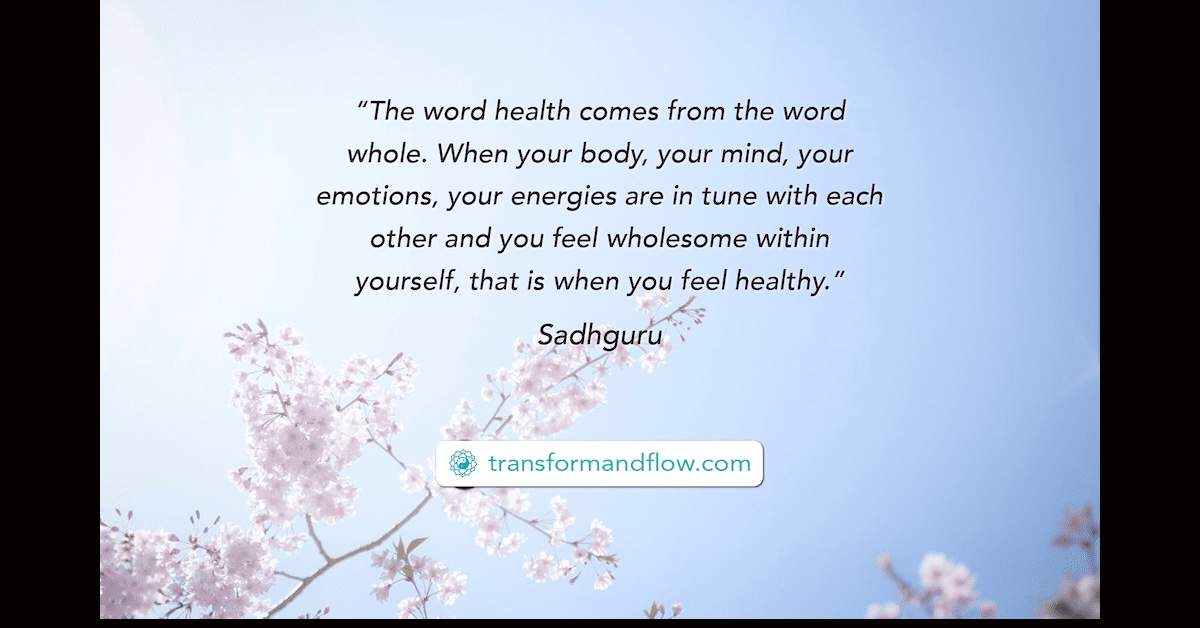Health is more than the absence of illness; it embodies a harmonious alignment of body, mind, emotions, and energies. Sadhguru, a renowned yogi and mystic, encapsulates this holistic perspective:
“The word health comes from the word whole. When your body, your mind, your emotion, your energies are in tune with each other and you feel wholesome within yourself, that is when you feel healthy.”
This viewpoint emphasizes that true health arises from the integration of our physical, mental, emotional, and energetic dimensions.
Maintaining Good Physical Health
Physical health forms the foundation of overall well-being. Engaging in regular exercise, consuming a balanced diet, ensuring adequate sleep, and undergoing routine medical check-ups are fundamental practices. These activities not only enhance bodily functions but also influence mental and emotional states. For instance, regular physical activity has been linked to improved mood and cognitive function, underscoring the interconnectedness of our physical and mental health.
Engaging in Practices that Enhance Mental Capabilities
The mind’s capabilities can be refined through various practices that promote cognitive function and mental clarity:
- Mindfulness and Meditation: These practices enhance attention, memory, and emotional regulation. Research indicates that mindfulness meditation can modulate brain networks associated with attentional control and self-awareness.
- Continuous Learning: Engaging in new skills or hobbies stimulates the brain, fostering neuroplasticity and cognitive resilience.
- Adequate Rest: Quality sleep is vital for memory consolidation and overall mental performance.
Resolving Emotional Challenges
Emotional well-being is integral to holistic health. Addressing emotional challenges can be achieved through:
- Therapeutic Guidance: Professional therapy provides strategies to navigate complex emotions, promoting mental health.
- Mindful Practices: Techniques such as breathwork and somatic exercises enhance emotional regulation. These practices focus on internal experiences, fostering a deeper mind-body connection.
- Social Connections: Building supportive relationships offers emotional support and a sense of belonging.
The Mind-Body Connection
The interplay between mental states and physical health is profound:
- Stress and Physical Health: Chronic stress can lead to conditions like cardiovascular diseases and weakened immunity. Understanding this connection highlights the importance of stress management for overall health.
- Mindfulness and Pain Management: Practices like mindfulness meditation have been shown to effectively reduce pain perception, offering drug-free pain management strategies.
Spiritual Well-Being and Inner Alignment
Spirituality plays a vital role in holistic health, offering a sense of purpose, peace, and deeper connection to life. Regardless of religious beliefs, engaging in spiritual practices can foster inner harmony and resilience:
- Meditative Practices: Regular meditation helps individuals connect with their inner self, reducing stress and fostering clarity.
- Self-Inquiry: Reflecting on personal values and purpose can lead to greater fulfillment and a sense of direction in life.
- Connection to Nature: Spending time in nature can provide a sense of peace and interconnectedness, improving mental and emotional well-being.
- Acts of Service: Helping others through kindness and compassion nurtures a sense of fulfillment and reinforces a deeper purpose beyond oneself.
Spiritual well-being is not about adhering to a specific ideology but about cultivating inner peace, mindfulness, and a deeper awareness of the present moment. This inner alignment contributes to overall health, reinforcing the interconnected nature of mind, body, emotions, and energy.
Conclusion
Achieving true health requires a harmonious balance of our physical, mental, emotional, and energetic aspects, as each plays a vital role in overall well-being.
Physical health forms the foundation, encompassing nutrition, exercise, sleep, and preventive care to maintain vitality and resilience. Mental health is equally crucial, involving cognitive clarity, stress management, and lifelong learning to foster a sharp, focused mind. Emotional health allows us to process and regulate feelings effectively, reducing stress and enhancing relationships. Energetic health, though less tangible, influences how we feel and function, encompassing practices like meditation, breathwork, and mindfulness to align inner vitality. When these four aspects are in sync, individuals experience a profound sense of well-being, clarity, and peace. Ignoring any one element can lead to imbalance, reinforcing the need for a holistic approach to health that nurtures the body, mind, emotions, and energy in unison. Achieving true health requires a harmonious balance of our physical, mental, emotional, and energetic aspects.
By nurturing each dimension, we cultivate a state of wholeness, aligning with Sadhguru’s vision of holistic well-being.
Exploring the Mind-Body Connection and Holistic Health Practices
Sources
verywellhealth.com – 7 Easy Somatic Exercises for a Healthier Mind and Body
nypost.com – Doing this for 20 minutes can get rid of pain, study finds
nypost.com – Doing this for 20 minutes can get rid of pain, study finds164 days agothetimes.co.ukBad back? Why t’ai chi and qigong could help107 days ago


